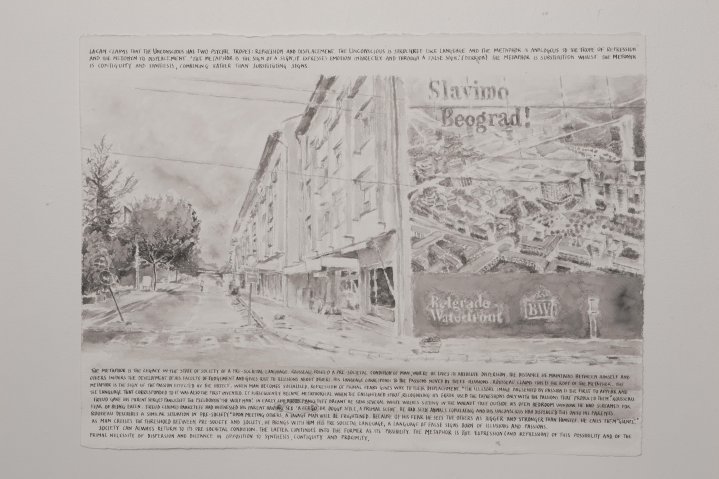
Slavimo Beograd
Watercolour and ink, 76 x 56cm, 2015
Text:
Lacan claims that the Unconscious has two psychic tropes: Repression and Displacement. The Unconscious is structured like language and the metaphor is analogous to the trope of repression and the metonym to displacement. ‘The metaphor is the sign of a sign, it expresses emotion indirectly and through a false sign’ (Derrida). The metaphor is substitution whilst the metonym is contiguity and synthesis, combining rather than substituting signs.
The metaphor is the legacy in the state of society of a pre-societal language. Rousseau posited a pre-societal condition of man, where he lives in absolute dispersion. The distance he maintains between himself and others impairs the development of his faculty of judgement and gives rise to illusions about others. His language corresponds to the passions moved by these illusions. Rousseau claims this is the root of the metaphor. The metaphor is the sign of the passion affected by the object. When man becomes socialised, repression of primal fears gives way to their displacement. ‘The illusory image presented by passion is the first to appear and the language that corresponded to it was also the first invented. It subsequently became metaphorical when the enlightened spirit, recognising its error, used the expressions only with the passions that produced them.’ (Rousseau)
Freud gave his patient Sergej Pankejeff the pseudonym ‘The Wolf Man’. In early childhood, Pankejeff dreamt he saw several white wolves sitting in the walnut tree outside his open bedroom window. He had screamed for fear of being eaten. Freud claimed Pankejeff had witnessed his parents having sex a tergo or doggy style, a primal scene. He had seen animals copulating and his unconscious has displaced this onto his parents. Rousseau describes a similar situation in pre-society: “upon meeting others, a savage man will be frightened. Because of his fear he sees the others as bigger and stronger than himself. He calls them ‘giants’”. As man crosses the threshold between pre-society and society, her brings with him his pre-societal language, a language of false signs born of illusions and passions.
Society can always return to its pre-societal condition. The latter continues into the former as its possibility. The metaphor is the expression (and repression) of this possibility and of the primal necessity of dispersion and distance in opposition to synthesis, contiguity and proximity.